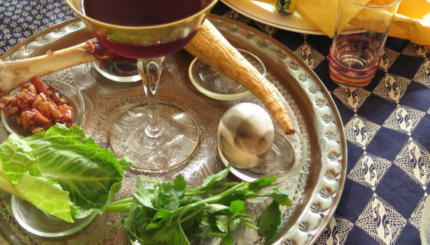On Passover, Jews avoid any products made from five forbidden grains: wheat, barley, spelt, oats and rye. Some Jews also avoid a category of foods called kitniyot that are not technically forbidden, but are similar enough to forbidden foods to risk confusion. Regular cow’s milk, therefore, is acceptable for consumption on Passover. Like all unadulterated agricultural products (save for those derived from one of the five prohibited grains), regular unflavored milk is kosher for Passover by definition and does not require any special certification. The only possible exception is milk that has been fortified with vitamins, which some believe are preferable to consume only if they have been certified kosher for Passover.
But in recent years, non-dairy alternative milk products have grown in popularity and these pose a number of unique considerations. The most general concern is that these products typically contain multiple ingredients which, even if they individually contain no leavened products, may still be made in facilities that also produce items that are not kosher for Passover. As a result, those who are strict in their Passover observance may still prefer to only use certified varieties.
Aside from the production issue, some types of non-dairy milk are clearly prohibited, others are clearly allowable and still others are somewhat in between. Here’s a general guide to non-dairy milks for Passover.
Oat Milk
Oat milk is the most straightforwardly problematic of the various milk alternatives. Oats are one of the five prohibited grains, along with wheat, barley, spelt and rye. Mixing oats with water, which is essentially what oat milk is, begins a process of fermentation, rendering oat milk hametz by definition.

Help us keep Jewish knowledge accessible to millions of people around the world.
Your donation to My Jewish Learning fuels endless journeys of Jewish discovery. With your help, My Jewish Learning can continue to provide nonstop opportunities for learning, connection and growth.
Almond Milk
Almonds are a nut and therefore pose no problem for consumption on Passover. In fact, many popular Passover foods are made from almonds, most notably macaroons. Almond milk therefore poses no inherent problem, save for the concern about production methods. A number of kosher companies now produce kosher-for-Passover almond milk that is available in many kosher grocery stores.
Soy Milk
Soy milk was among the first non-dairy milks to become widely available. It is produced by blending processed soybeans with water and a few other ingredients for flavor, nutrition and texture. Soybeans fall into a category known as kitniyot, which historically was permitted to Sephardic Jews on Passover but not Ashkenazi ones. This distinction has begun to break down in recent years following the Conservative movement’s decision to permit consumption of kitniyot on Passover. However, since Orthodox Ashkenazi Jews generally do not consume kitniyot on Passover, it is all but impossible to find soy milk in the United States that is certified for consumption on Passover.
Rice Milk
Like soybeans, rice is also considered kitniyot, so the same principles apply.
Coconut Milk
Like almonds, coconuts are permitted for consumption on Passover and the only issue is the processing method. A small number of food manufacturers do produce coconut milk that is certified for use on Passover.
Other Milks
Other non-dairy milks generally follow the same principles as outlined above. Those that are produced from nuts or seeds — like cashews, hazelnuts and flax — are fine for consumption on Passover, though they may be hard to purchase with a kosher-for-Passover certification. Those produced from legumes, like pea milk, are problematic due to the concern over kitniyot. Those produced from a prohibited grain, while rare, would not be permissible to consume on Passover.



